#darius of persia
Text
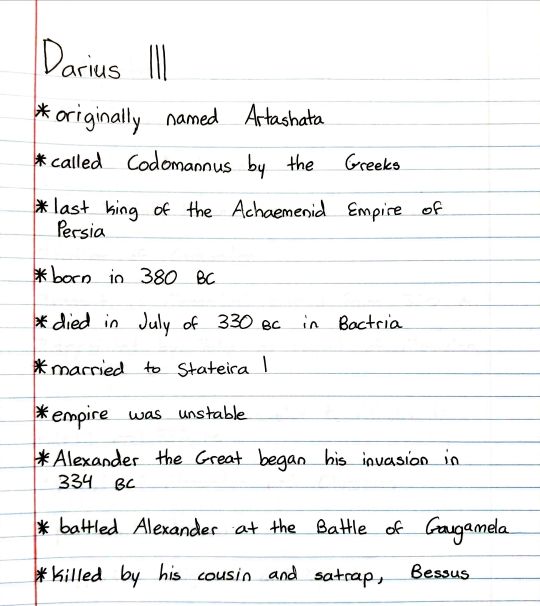
Patreon
#studyblr#notes#history#historyblr#world history#western civ#western civilization#greek history#alexander the great#codomannus#darius III#artashata#persia#persian history#battle of gaugamela#bessus#darius of persia#bactria#ancient history#ancient greece#ancient persia
2 notes
·
View notes
Text
Dear Force, this deserves its own post
Legasy of Firs Blade is giving me second-hand embarassment. They are trying to swing Natakat/Kassandra things so hard but -
Half the story it feels like it’s you babysitting Natakas (not quite, but it feels like that) and the other? Listening to Darius angst. All while having the tough choice of picking among:
I trust Darius
I don’t trust Darius
I trust no one
Like. Can I get a “I don’t know him enough to trust him?”
And. They are really, really trying to make it feel like Kassandra wants to settle down. Meanwhile, my Kassandra is screaming internally:
“I don’t even know you, people! Why are you unloading your angst on me???”
I mean. It could work. But the plot doesn’t give it all a chance to work. Even the Order members (other than the twisted-minded Hunter - whom I did like. Now, if only he wasn’t out to kill Kassandra...) felt quite flat
Heeeere’s to hoping Achaia goes better paced
Meanwhile, I’ll let the pretty pretty eyes of Darius tide me over. Seriosly. Best modeled eyes in the game. And they went to a hair-trigger, murder happy guy who (possibly) moonlights as Sasuke in some crossover
#Assassin's Creed: Oddysey#Legacy of First Blade DLC#Darius of Persia#Natakas#Kassandra of Sparta#Let us all take a moment to appreciate that Hidden Ones did not begin with Darius#And that we have the *Stray your blade from the flesh of the innocent* tenet#Are you seriously expecting me to ltruly like Darius after he went ho to assassinate Artaxerxes?#The sweet guy we run an entire quest line for?#Just describing him the pretty places we have seen?#The one that was very understanding if Kassandra was honor bound to kill him since his ancestor killed her ancestor?#...That and I am feeling more and more like a cradle robber as the story goes on
2 notes
·
View notes
Text
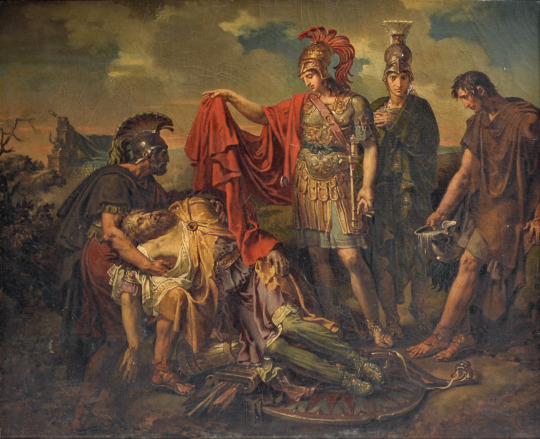
Alexander covering the body of Darius with his cloak
by Charles Meynier
#alexander the great#darius#art#charles meynier#antiquity#history#europe#european#asia#persia#persian#ancient greek#ancient greece#macedonian#macedonia#greek#greece#achaemenid empire#macedonian empire#king#persian empire
247 notes
·
View notes
Text
Your kingdom of heaven:



My empire of heaven:

"Persepolis"
Founded by the order of Darius I in 518 B.C., Persepolis was the capital of the Achaemenid Empire


Darius |
[Glory to ahura mazda ✨️]
#kingdom of heaven#fandom#kingdom of heaven 2005#art#artists on tumblr#imagine#kingdom of heaven fandom#the leper king#king baldwin iv#baldwin iv#koh fandom#koh#achaemenid#history#ancient history#ancient persia#persian empire#achaemenid empire#Darius the great
21 notes
·
View notes
Text




I thought there would be many fanarts of ancient Persia but no.
#acheamenid empire#ancient history#ancient persia#darius the third#persian empire#bagoas#nabarzanes#alexander the great#ancient greece#art#art history
12 notes
·
View notes
Text
ATG Symposium
Just a reminder to all-and-sundry that I'm still covered up with the Alexander the Great conference, which begins TOMORROW, right here in Omaha. 30-something scholars from all over the world. Super-cool. Link to the full schedule below, if you're curious. Two keynotes, one experimental archaeology session and eleven regular paper sessions across 2.5 days. I may be dead by the time it's over. LOL
9th International Alexander the Great Symposium: Repercussions of Violence under Alexander and the Succesors
#alexander the great#ancient macedonia#diadochi#ancient greece#ancient persia#achaemenid persia#darius III#Classics#ancient history#academic conferences
12 notes
·
View notes
Text
Working on a side-by-side comparison of The Song of Achilles (Madeline Miller) and The Persian Boy (Mary Renault) because I hold that a large volume of the issues in TSOA's characterization of Patroclus come directly from Miller's attempts to make him a similar viewpoint character to Bagoas, and therefore, cast Achilles in a similar light to Renault's Alexander. I will note that Miller has not yet (to my knowledge) named The Alexander Trilogy specifically as an inspiration for The Song of Achilles, but she has named Renault as an inspiration, as well as a few other books of hers, so I think the likelihood is high she was referencing it. It's fairly obvious to me that the first line of The Song of Achilles is in the same vein as the first line of The Persian Boy, and I suspect that is intentional; both as a form of homage to the structure of epic poetry, and as a means of emphasizing the importance familial ties will play in the text.
"My father was a king and the son of kings" vs. "Lest anyone should suppose I am a son of nobody..."
Miller's Patroclus is not beat-for-beat Renault's Bagoas, but I do believe he's inspired by and designed to almost contrast with him. Bagoas identifies deeply with his lineage and his father, who were taken from him early, while Patroclus does not identify with his lineage and was rejected by his father. Bagoas wants to be a man by the terms of his society, but is prevented from doing so, while Patroclus rejects most of his culture's aspects of manhood, and the one time he meets them he is killed. It's important, however, that both of them are noncombatants (by choice or no) because it positions them away from the acts of killing, rape, and destruction their Special Blond Guys are doing, thereby making the blondies more likable. But while Bagoas's position as a noncombatant is rooted in history, Patroclus's is a notable departure from his position in The Iliad.
I'll go more in depth on all of this once I have the time, but if you haven't read any of Renault's works, I highly recommend them. Prepare yourself for a... flawed portrayal of Persia though.
#my favorite petty renault complaint is that she has bagoas respond to darius becoming king with “i met a guy called darius. is that him?”#when darius is the name he took UPON BECOMING KING#because persian kings took new names when they took the throne#a practice that is actually pretty easy to learn about#it's a small complaint in the grand scheme of things but i think it's illustrative of her general lack of care#which is a real shame because almost THE ENTIRE BOOK is set in persia like ma'am!#and you really feel it in the first 100 pages#classics#the song of achilles#the persian boy#madeline miller#mary renault#dex rants
7 notes
·
View notes
Text
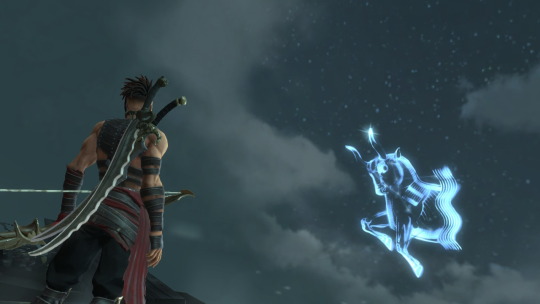
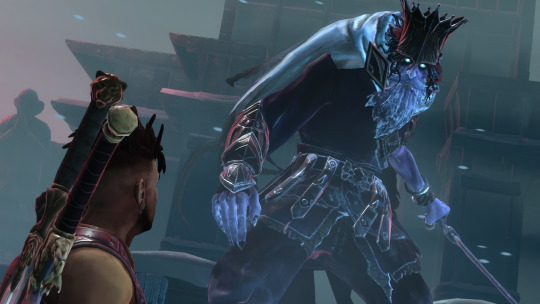
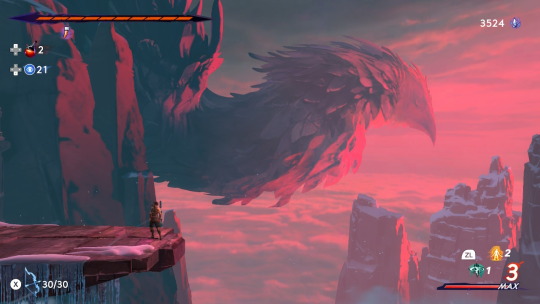
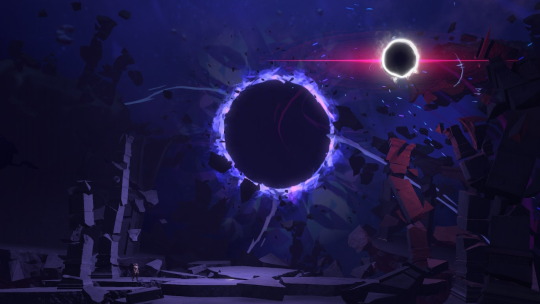
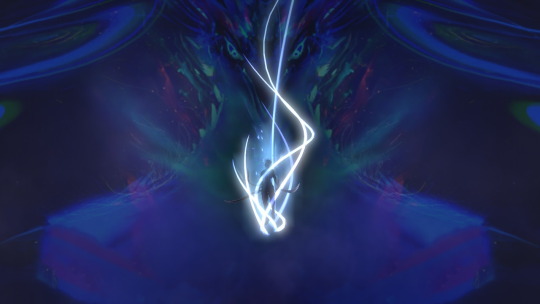
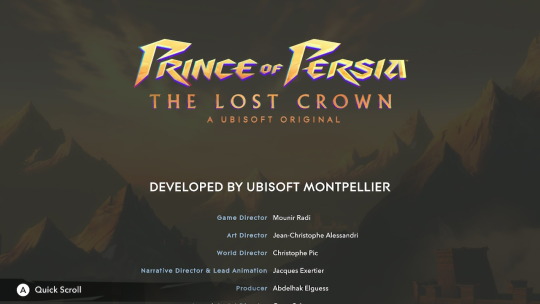
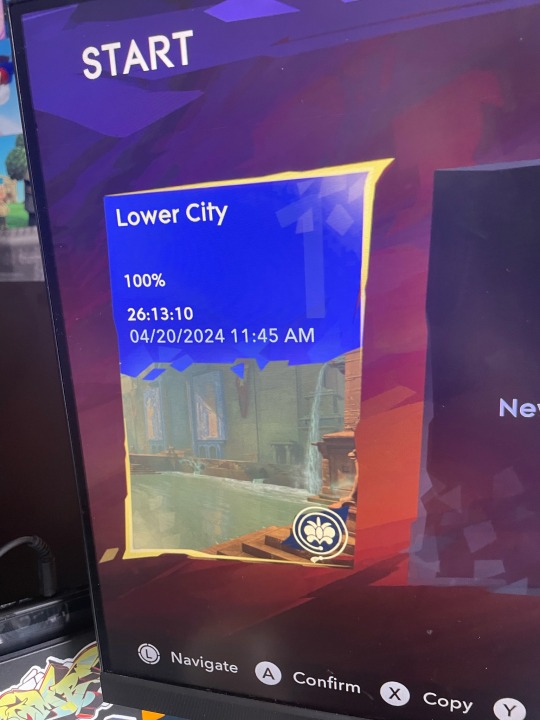
April 20th 2024 - WOOOO I 100%ED PRINCE OF PERSIA: THE LOST CROWN. THIS GAME IS PHENOMENAL! What a supremely crafted Metroidvania with so much heart and soul! One of my favourite games of the year so far!
Going full completionist is a badge of honour I don’t bestow for many games, but this one fully deserved it. Absolutely check it out for your Metroidvania fixing, it is an experience worth having!
#gaming#video games#nintendo#nintendo switch#prince of persia#pop#pop tlc#prince of persia the lost crown#the lost crown#ubisoft#ubisoft montpellier#metroidvania#metroidvanias#2d platformer#2d games#sargon pop#sargon#vahram#king darius#completion#completionist#100% completion#simurgh
11 notes
·
View notes
Text
Persian History in the Style of Dave Attell

Alright, folks, let’s dive into the wild world of the Persian Empire. Grab a drink. This isn’t just some boring history lesson. No way! We’re talking about an empire that spanned continents, had kings that loved bling, and a penchant for some seriously extravagant parties. It’s like the history version of your wild uncle who shows up at the family reunion with tales of crazy adventures and slightly questionable choices.
**The Early Days: The Achaemenids Bet Big**
So picture this: we’re back in the 6th century BCE, and a dude named Cyrus the Great rolls onto the scene. He’s like the original Persian bad boy. This guy wasn’t just ruling a small tribe; he was out there building an empire that would make Alexander the Great look like some kid playing with his mom's little toy soldiers. Cyrus united the Persian tribes, the Medes, and said, “You all want to chill? Let's do this together.” Then off he went conquering like it was a never-ending game of Risk.
Cyrus snatched up Babylon and let’s be real, that wasn’t just a casual takeover. He was all about freedom. He even freed the Jewish captives, probably thinking, “No one wins when you keep people locked up!” This dude crafted the Cyrus Cylinder; think of it as the original human rights declaration. So, yeah, he was the good guy, at least for a while!
**Darius the Great: The Planner with a Beard**
Fast forward a bit to Darius the Great! This guy was like the meticulous accountant of empires. He looked at Cyrus’s accomplishments and said, “That’s cute, but let’s make it bigger!” Darius was the kind of king who actually cared about administration. He took this wild collection of conquered lands, organized them into satrapies – think of them as state parks but without the annoying entry fees and trade all those trees for a whole lot of dust.
Darius had roads built! That's right, folks, those super-highway-like roads were like the ancient version of Google Maps. He had the Royal Road constructed, so if you wanted to get from one part of the empire to another without losing your way or getting stuck in traffic, you could. And he was behind that whole Zoroastrianism movement, which is all about good thoughts, good words, and good deeds. Basically, he was the Pinterest king of morality.
**Xerxes: The Dramatic Soap Opera Star**
Now, Xerxes comes in later, and let me tell you, this dude had a flair for the dramatic. He could’ve hosted his own reality show! This guy gets all fired up, decides he wants revenge on Greece after that little fiasco at Marathon. Remember that? It was like the Greek version of the Super Bowl! So, he gathers an army that makes every other army look like a kindergarten field trip. What does he do? He crosses the Hellespont on a bridge made of boats. I mean, come on! That’s some epic show-off behavior.
But poor Xerxes, he faces a little setback at the Battle of Thermopylae. You know that battle where 300 Spartans become legends? Yeah, that was him. He walks into what he thinks will be a walk in the park, and instead, he’s greeted with a bunch of guys in speedos yelling like crazy. That's a tough way to go, dude. But hey, he did burn Athens down. So he got some victory points there, but also a lot of really angry Greeks.
**The Fall of the Achaemenid Dynasty: Enter Alexander**
So what happens next? The Persian Empire isn’t quite peaking anymore. There’s this guy named Alexander the Great – can you hear me rolling my eyes? He shows up and says, “Let’s conquer Persia!” Now, this isn’t just your average conquest. He had charisma dripping off of him. You know the guy at the bar who doesn’t seem to care what you think but still somehow makes you really like him? That’s Alex.
He’s out there defeating Persian armies like it's just another day at the gym. The Battle of Gaugamela? Yeah, that was like the ultimate showdown. By 330 BCE, Persia was no more; it’s like they fell asleep at the wheel. Alexander rides into the night with all the treasures and then some, and Persia goes from a glorious empire to just another footnote in history. It’s like waking up from a wild party and realizing you left your wallet behind.
**The Legacy of Persia: Influence and Culture**
But don’t count the Persians out just yet! Even though the empire fell, their influence didn’t just disappear like the last slice of pizza at a party. Persian art, culture, and governance inspired countless civilizations. Their system of roads? Genius! Influenced everyone from the Romans to modern infrastructure. That’s some solid legacy vibes!
And how about their architecture? I mean, ever heard of Persepolis? That wasn't just a city; it was a statement. Imagine showing up there; it’s like walking into the most lavish mansion ever, where every corner is just dripping with art and sophistication. It left people saying, “Wow, these guys knew how to throw down.”
**Sassanid Empire: The Comeback Kings**
We can’t wrap this up without giving a nod to the Sassanid Empire. After a little wait, the Persians were back in action with a new dynasty! This is where things get spicy again. The Sassanids were all about Zoroastrianism, and they had some pretty serious rivalries, especially with the Romans. You thought your family reunions were dramatic? These guys were waging battles like it was Thanksgiving dinner gone wrong.
They expanded territories, absorbed new cultures, and even managed to give rise to some impressive innovations during the Golden Age. You could say they were the comeback kings of history, taking all the good stuff from the past and turning it into something fresh and new.
**The Enduring Legacy of the Persian Empire**
With the rise of the Islamic Caliphates, the Persian Empire took a back seat, but hint hint: it didn’t just disappear! Persian culture, language, and connections persisted, and it influenced the new empires that sprung up. You see? When it comes to empires, it's not always just about the fall; it’s about the cultural endurance of the people.
Persian poetry, literature, and philosophies surged through the ages like an unstoppable current. You can even spot traces of old Persian artistry in modern-day Iran and beyond. That’s like the cherry on top of a historical sundae, folks!
**Final Thoughts: The Persian Wild Ride**
So there you have it: the wild ride of the Persian Empire! From Cyrus the Great to the dramatic flair of Xerxes, through epic battles, cultural legacies, and some seriously ornate parties, they lived their history with a bit of style – and maybe a little swagger. They taught everyone that being an empire isn’t just about conquering and ruling; it’s also about the contributions and influences that echo through time, like the earworm of a catchy song you just can’t shake.
Next time you think about the Persian Empire, remember it wasn’t just a bunch of kings on thrones; it was a cornucopia of culture, innovation, and a few questionable fashion choices along the way. So raise your glasses to these guys – it’s been a journey! Cheers!
2 notes
·
View notes
Text
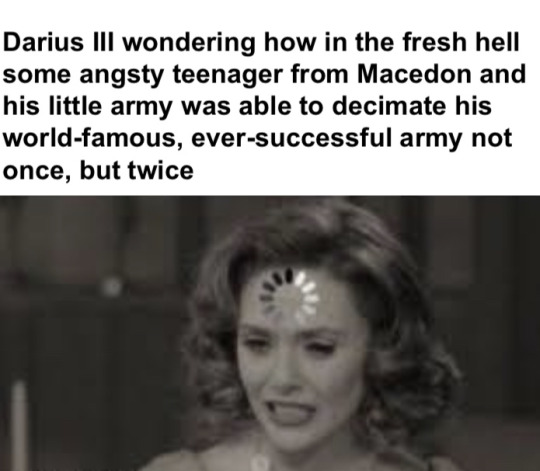
And then getting disowned by his mom, and then being chased around all over his former kingdom, and then getting killed by Bessus, and then…
#historical memes#history#history memes#meme#memes#ancient history#historical#Persia#persian empire#achaemenid#Achaemenid empire#Darius#Darius iii#alexander of macedon#alexander the great#macedon
121 notes
·
View notes
Text

Hauma-drinking Scythian on western stairway of Palace of Darius 6th-5th C. BCE.
"The Sacae, who are Scythians, had on their heads tall caps, erect and stiff and tapering to a point; they wore breeches, and carried their native bows, and daggers, and axes withal, which they call 'sagaris'. These were Amyrgian Scythians, but were called Sacae; for that is the Persian name for all Scythians."
-Herodotus, The Histories, Book 7, Chapter 64
...
"The Amyrgians (Ancient Greek: Αμύργιοι Amúrgioi; Latin: Amyrgii; Old Persian: 𐎿𐎣𐎠 𐏐 𐏃𐎢𐎶𐎺𐎼𐎥𐎠 Sakā haumavargā "Sakas who lay hauma (around the fire)") were a Saka tribe.
The Greek name for this tribe, Amúrgioi (Αμύργιοι), is the Hellenised form of the Old Persian term Haumavargā (𐏃𐎢𐎶𐎺𐎼𐎥), meaning "who lay hauma (around the fire)," and can be interpreted as "revering hauma." The full name of this tribe in Persians Achaemenid inscriptions is Sakā haumavargā (𐎿𐎣𐎠 𐏐 𐏃𐎢𐎶𐎺𐎼𐎥𐎠), that is the Sakas who lay hauma (around the fire)."
Haoma has its origins in Indo-Iranian religion and is the cognate of Vedic soma. Both Avestan haoma and Sanskrit soma derived from proto-Indo-Iranian *sauma. The linguistic root of the word haoma, hu-, and of soma, su-, suggests 'press' or 'pound'.
-taken from wikipedia
#scythian#saka#persia#persepolis#history#ancient history#indo european#literature#herodotus#darius the great#statue#sculpture#pagan
47 notes
·
View notes
Text
The Apadana coin hoards, Darius I, and the West
Antigoni Zournatzi "The Apadana coin hoards, Darius I, and the West", American Jounal of Numismatics, 15 (2003)
This paper supports a perception of the Apadana coins (JGGH 1789) as symbols of Darius I’s control of important western sources of wealth and leading centers of western commercial/economic activity. It submits, among other things, that an interpretation of the coins as issues of states already under Persian sway by the time of the foundation of the Apadana need not imply a date as late as the 490s for the foundation of that building. References to important western holdings in this context most likely reflect the prestige that Darius, his Persian predecessors, and earlier Mesopotamian rulers attached to the conquest of far-of western lands.
2 notes
·
View notes
Text
Y’all’re missing out by seeing Aeschylus as severe and lofty. My man was funny as hell
3 notes
·
View notes
Text
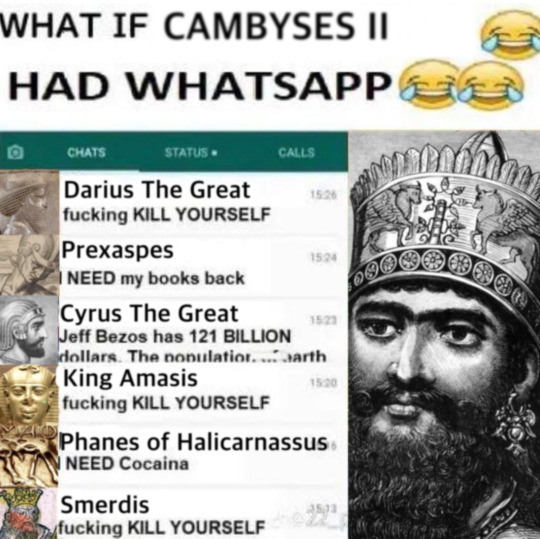
this was so much funnier in my head
#my ancient history teacher is going to hate me#cyrus the great#cambyses ii#darius the great#phanes of halicarnassus#smerdis#bardiya#prexaspes#king amasis#ancient persia#IT FEELS SO FUCKING WEIRD TAGGING THIS LIKE ANCIENT PERSIA IS A FANDOM HELP 😭😭#sourtalks
46 notes
·
View notes
Text

Darius I, commonly known as Darius the Great, was a Persian ruler who served as the third King of Kings of the Achaemenid Empire, reigning from 522 BCE until his death in 486 BCE.
#darius#darius the great#persia#iran#persian empire#king of kings#midjourney#ai image#ai art#ai generated#history#ancient#antiquity
6 notes
·
View notes
Note
Hi. Do you know what happened to Darius's son? Thank you.
We don't. We're not even 100% sure he had one. The boy appears almost exclusively in Curtius,* the narrative of Darius' family before Alexander. He's portrayed there to contrast his father: see, the son--a little boy--is braver! It also showcases Alexander's kindness and clemency, as he picks him up, doesn't kill him in front of his mother.
But Ochus (the boy) disappears from the narrative after this. This presents three possibilities:
Alexander had him killed at some point after, because he could become a rallying point for rebel Persians. Or Alexander feared he might rebel himself when he grew up.
Alexander had him spirited away and put in hiding to keep him away from rebel Persians who might use him as a figurehead.
There was no son.
I'm going with door #1 or #3, probably #3. While it's not necessary that Bessus would claim the upright tiara in the name of Darius's son, the fact he claims it for himself might be suggestive. The reason I don't think it's #2: it's simply too dangerous for Alexander to let him live...although he does let Darius's brother live, so....
Nonetheless, I just think it's just meant to be a contrasting example to Darius. The Greeks didn't understand ANE omens of king-death on the battlefield, so they simply regarded Darius's retreat as cowardice.
-------
*The only other mention is the Fragmentum Sabbaiticum, which might be contemporaneous with Arrian. Stress on "might."
#asks#Darius III#Alexander the Great#Persian family of Darius#ancient Persia#ancient Macedonia#Alexander the Great's conquests#Classics
16 notes
·
View notes